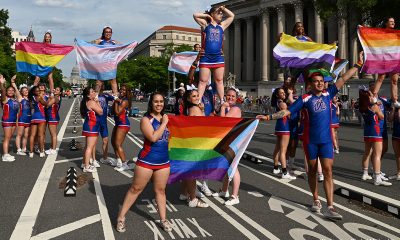World
Out in the World: LGBTQ news from Europe and Asia
French President Emmanuel Macron has described pro-trans policies as ‘ludicrous’

FRANCE
French President Emmanuel Macron faced backlash after describing pro-transgender policies proposed by his political rivals as “ludicrous” during a World War II commemoration on June 18.
Macron criticized the left-wing New Popular Front’s proposal to simplify legal gender changes, saying, “There are completely ludicrous things, like going to change sex in town hall.”
Opposition leaders quickly condemned Macron’s remarks. Jean-Luc Melenchon, a left-wing party leader, called the comments “outrageous” on social media.
The controversy comes as France prepares for national elections on June 30, with Macron’s Renaissance party facing pressure from both far-right and left-wing coalitions.
UNITED KINGDOM
The UK Labour Party, favored to win the July 4 election, released a manifesto with limited LGBTQ commitments, disappointing trans rights advocates.
Labour pledges to strengthen hate crime laws and ban conversion therapy, including for trans individuals. However, the party will maintain requirements for medical diagnosis in legal gender changes and support single-sex spaces that may exclude trans people.
The manifesto reflects ongoing debates in British politics over trans rights, fueled by activist groups and high-profile figures like author J.K. Rowling.
Labour leader Keir Starmer’s attempts to balance competing views have drawn criticism from both trans rights supporters and opponents.
PHILIPPINES
During a virtual synod, Jack Lorenz Acebedo Rivera, a Filipino student, urged Pope Francis to stop using offensive language against the LGBTQ community.
The request came after Francis reportedly used a derogatory Italian term translated as “faggotry” in closed-door meetings, criticizing its prevalence in Catholic institutions.
The pope’s reported language sparked protests, including at Rome’s Pride March on June 16. The Vatican issued an apology for the first instance but hasn’t addressed subsequent reports.
India
Fewer Indian MPs are ‘vocal’ on LGBTQ issues
Parties backed relationship recognition, trans rights ahead of general election

The Indian LGBTQ community is gradually gaining momentum in their fight for rights; bolstered by increasing support from courts, the public, NGOs, and even some politicians.
According to Pinklist India’s 2024 report, which archives politicians supporting LGBTQ rights, only 108 MPs have been vocal on LGBTQ issues, a notable decline from the 161 MPs in the previous parliament. In this context, “vocal” means that politicians have made public statements on LGBTQ issues, whether positive, negative, or controversial.
As India prepared for the 2024 general election, various political parties included LGBTQ concerns in their platforms.
The Indian National Congress, for example, has promised to introduce a bill that would recognize civil unions for LGBTQ couples after wide consultation. Similarly, the Communist Party of India has pledged several commitments, including amending the Transgender Persons (Protection of Rights) Act 2019 to address community concerns and ensure legal recognition and protection for same-sex couples similar to marriage.
The Prime Minister Narendra Modi-led Bharatiya Janata Party and its coalition partners, meanwhile, had promised in their campaign platform to include the transgender community in the Ayushman Bharat Yojana, a national health insurance program for low-income citizens. The BJP also pledged to incorporate the trans community into the Garima Greh program, which provides shelter, food, medical care, and recreational facilities for destitute and abandoned trans people.
No official records exist on the LGBTQ population in India, but the 2012 Census estimated it at 2.5 million. Population data on LGBTQ people is scarce, with the government only tracking those who identify as “third gender” or “transgender” and are registered.
Only a few LGBTQ candidates ran in this year’s general election, with the majority of them withdrawing. Of the three candidates who ran, none secured a sixth of the total valid votes, resulting in all of them losing their deposits.
Election Commission of India (ECI) data indicates there are 48,000 registered trans voters. Only 20 percent of them participated in the general election.
Pinklist India data in 2020 revealed that only 27.8 percent of 543 MPs had addressed LGBTQ issues in their political careers. The highest number of these MPs belonged to the Nationalist Congress Party, the Indian National Congress, and the Communist Party of India. Pinklist India also created interactive tiles on India’s map, titled “State of QUnion,” recording statements on LGBTQ issues made by each MP.
Data from 2020 offers deeper insights into how politicians’ stances on LGBTQ issues evolve after joining a particular party.
Jothimani Sennimalai, an Indian National Congress MP from Karur, Tamil Nadu, for example, has consistently supported queer issues both before and after entering politics. Conversely, Bengaluru South BJP MP Tejasvi Surya, who previously supported marriage equality, has remained silent on the issue since his election. The Washington Blade reached out to Surya multiple times for an interview, but received no response.
Interestingly, previous data revealed a curious trend among many MPs.
Although they were vocal about trans issues outside parliament, they never engaged in debates on trans laws within it. Their silence in parliamentary chambers contrasted sharply with their public statements, painting a complex picture of political advocacy.
The Blade uncovered a striking disparity: Despite political parties pledging inclusion of the LGBTQ community in their election platforms, no major politicians addressed LGBTQ concerns during their campaign rallies. It was as if these promises, vibrant on paper, vanished into thin air when it came time to speak on the campaign trail.
The Blade reached out to Meera Pradhan, a trans politician from Odisha’s Biju Janata Dal, for her thoughts on the issue.
“It is very sad that it has happened,” she said with a mix of disappointment and resolve.
Pradhan lamented that during the passage of the Transgender Persons (Protection of Rights) Act in 2019, only regional parties stood in support of the bill, highlighting a gap in broader political commitment.
“Unfortunately, we have to meet and sensitize new parliamentarians about the issue,” said Pradhan. “It is very sad that those leaders and members of Parliament are doing this who are supposed to raise voices for everyone including LGBTQ people of the country. We say that India is the world’s biggest democracy, we talk about equality, we talk about Sabka Sath Sabka Vikash (inclusion and development for all, a slogan Modi used during the election campaign), so does LGBTQ people not come under ‘all’? If parliamentarians behave like this, what will be the impact on the society?”
She raised a question stating that LGBTQ people are born naturally just like males or females, so why there is so much stigma regarding the community? Pradhan told the Blade that despite so many Supreme Court rulings and parties including LGBTQ issues in their election platforms, not a single party gave the opportunity to LGBTQ people to fight the election from the party platform.
Ankush Kumar is a reporter who has covered many stories for Washington and Los Angeles Blades from Iran, India, and Singapore. He recently reported for the Daily Beast. He can be reached at [email protected]. He is on Twitter at @mohitkopinion.
Africa
Congolese justice minister orders prosecutor general to arrest LGBTQ allies
Constant Mutamba issued directive on June 15, implementation unclear
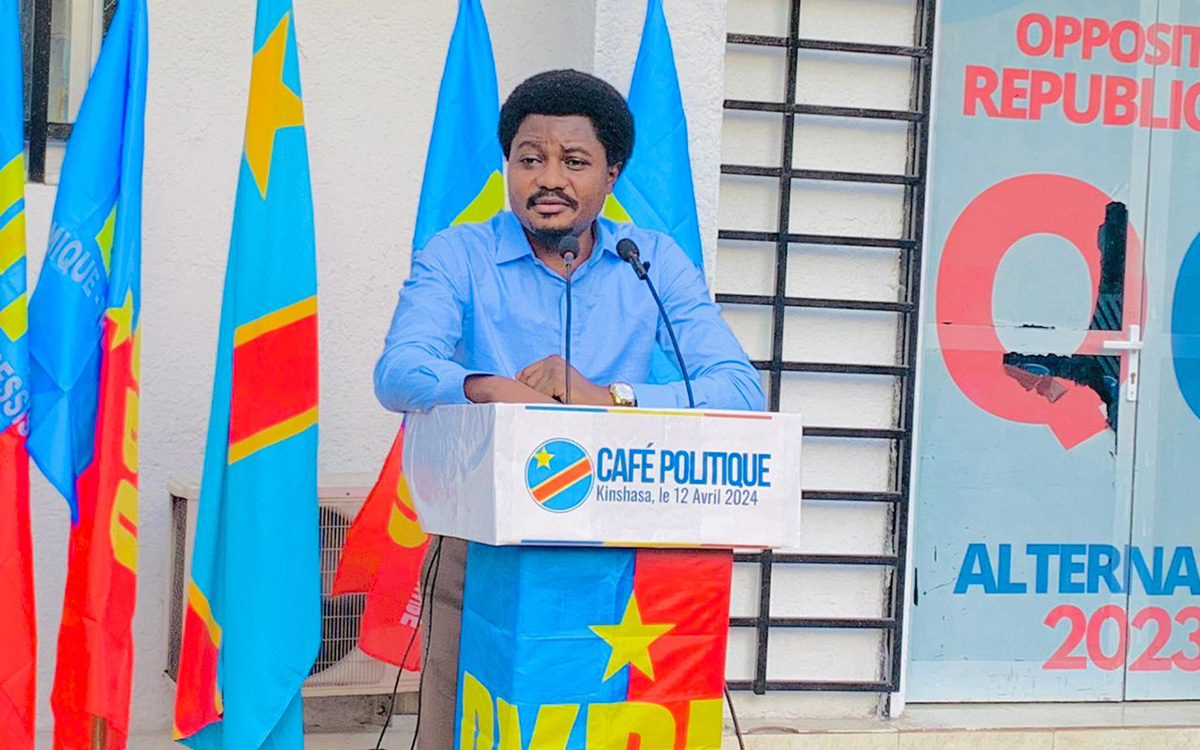
Congolese Justice Minister Constant Mutamba has instructed his country’s prosecutor general to arrest LGBTQ allies.
The newly appointed justice minister in a June 15 communique said the prosecutor general should initiate legal proceedings against people who advocate for the LGBTQ community in Congo.
Although same-sex marriages are constitutionally prohibited, there is currently no law that criminalizes consensual same-sex sexual relations. The communique has raised a lot of eyebrows from social and LGBTQ activists who are asking on what grounds Mutamba issued the communique.
“He could have started by initiating a bill in this direction, but in the current Congolese legislation he is missing the point,” said Jean Claude Katende, a Congolese human rights activist who is the president of the African Association of Human Rights. “If he wants to repress homosexuals, he must initiate a law which must make this behavior an offense and have it punished. He will be arrested for complicity in arbitrary arrests. The constitution is clear, no one can be prosecuted for an act which does not constitute an offense.”
Khelver Hermano, a Congolese social commentator, said the law should not be interpreted based on one person’s emotions.
“LGBT marriage is already not applied in the DRC but the minister wants to incarcerate those who do it informally without a legal basis,” said Hermano. “The law is not interpreted according to our will.”
“Does the penal code in the DRC recognize polygamy? Why don’t we arrest all these known polygamists?” asked Hermano. “Just as polygamists are not prosecuted, we cannot do so against LGBT people.”
Many Congolese people, however, have welcomed the communique, arguing same-sex relations are un-African and unorthodox.
Article 172 of the country’s penal code states a person “who commits a moral crime by exciting, facilitating or promoting to satisfy the passions of others, debauchery or the corruption of persons of either sex under or apparently under the age of 21 years shall be punishable by a prison term of three months to five years or a fine.” Article 176 says a person “who engages in activities against public decency shall be punishable by a prison term of eight days to three years and/or a fine.”
Although not entirely applicable, the prosecutor general can use these two penal code articles to initiate the arrests — the country in recent years has seen some arrests of LGBTQ people.
The June 15 communique is not the first time Mutamba has come out against the LGBTQ community.
Mutamba earlier this year introduced a bill that would criminalize acts of homosexuality. The proposal received widespread support, particularly on social media where many Congolese people described it as a turning point for the country and for the continent at large.
Although parliament has not formally debated the bill, activists are concerned it will pass without many major objections because most MPs have previously said they do not support the LGBTQ community. It remains unclear how the prosecutor general will executive Mutamba’s communique.
European Union
Gay US ambassador to Hungary marches in Budapest Pride parade
David Pressman has criticized government’s anti-LGBTQ crackdown

U.S. Ambassador to Hungary David Pressman on Saturday marched in the annual Budapest Pride parade.
Pressman, who is gay, posted to his X account pictures of him holding an American flag while standing behind a banner that read “United States embassy.” Pressman on Sunday spoke at Budapest Pride’s Family Pride Event that took place at his official residence.
“We’ve gathered for a celebration of families, of freedom, and of love — all things that are increasingly under attack for LGBT people in Hungary,” he said.
Pressman in his speech referenced a joint statement from 35 countries that expressed “serious concern about the targeting of LGBTQI+ people in Hungary, and called for the government to eliminate its discriminatory laws, policies, and practices.”
The U.S., Australia, Austria, Belgium, Bulgaria, Canada, Croatia, Cyprus, Czechia, Denmark, Estonia, Finland, France, Germany, Greece, Iceland, Ireland, Kosovo, Latvia, Lithuania, Luxembourg, Malta, Montenegro, North Macedonia, New Zealand, Norway, Poland, Portugal, Slovenia, Spain, Sweden, Switzerland, the Netherlands, the U.K. and Ukraine signed the statement alongside the U.S. and the General Delegation of Flanders, the Austrian Cultural Forum Budapest, the British Council, the Czech Centre, FinnAgora, Institut Français, Goethe-Institut, Instituto Camões and Instituto Cervantes.
“On the occasion of the 29th Budapest Pride Festival, we the undersigned embassies and cultural institutes express our full support for members of the lesbian, gay, bisexual, transgender, queer, and intersex (LGBTQI+) community in Hungary and their rights to equality and nondiscrimination, freedom of expression and peaceful assembly, and freedom from violence, among others,” reads the statement. “Respect for the rule of law and universal human rights are the foundations upon which democratic states are build. International human rights law is grounded on the broad premise that all individuals have the same rights and freedoms without discrimination.”
Pressman in his speech said the Family Pride Event took place “at a time when democracy itself — in this country and around the world — is confronting unprecedented and serious threats.”
“I’d like to talk with you this afternoon about freedom and democracy; and about those who instrumentalize love to undermine both,” said Pressman.
“The fact that LGBT people and democracy are both under increasing attack is no coincidence,” he added. “Those who seek to undermine democracy, traffic in fear; and, tragically, few currencies of fear continue to hold more value than the love in this community.”
Pressman further noted “posters all over Budapest during this political season fixated on you,” referring to LGBTQ Hungarians.
“It’s why your parliament adopted laws aimed at you, and your government is now implementing those laws to target you,” he said.

Pressman has been a vocal critic of Hungarian Prime Minister Viktor Orbán and of his government’s crackdown against LGBTQ rights that has grown worse over the last decade.
The U.S. ambassador in 2023 reiterated these criticisms during a Budapest Pride reception.
Budapest Pride spokesperson Johanna Majercsik earlier this month told the Washington Blade that Pride “is a particularly important event in Hungary.” (The Blade in April traveled to Budapest, and interviewed Majercsik and other Hungarian activists.)
“Despite being a full member of the European Union since 2004, the Hungarian government has systematically reduced the rights of the LGBTQ+ community,” said Majercsik. “The government apparently doesn’t want to stop there, inciting people against our community, and making references about passing new anti-LGBTQ laws in the future (calling them child protection laws).”
-
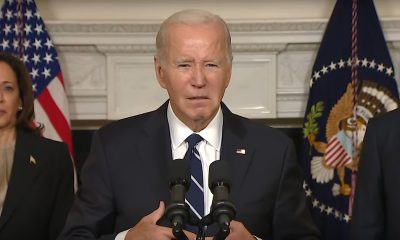
 The White House4 days ago
The White House4 days agoHISTORIC: Biden pardons discharged LGBTQ veterans
-

 a&e features4 days ago
a&e features4 days agoQueer TV anchors in Md. use their platform ‘to fight for what’s right’
-
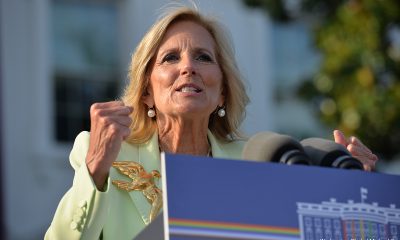
 The White House4 days ago
The White House4 days agoJill and Ashley Biden headline White House Pride celebration
-
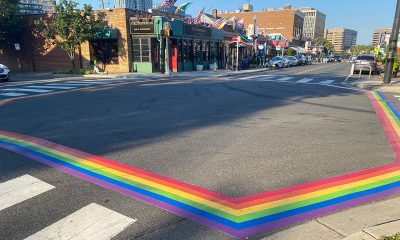
 Virginia5 days ago
Virginia5 days agoRainbow crosswalks, street murals installed in Alexandria, Arlington





